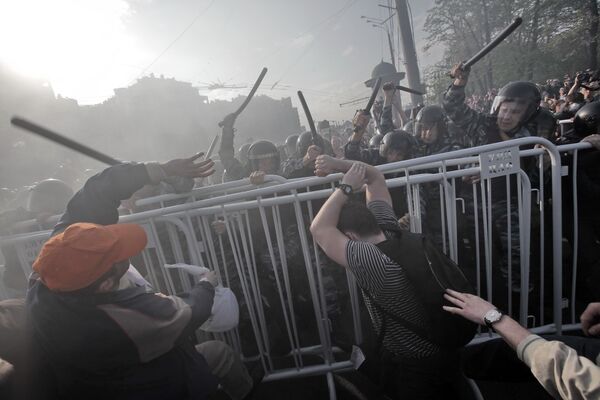MOSCOW, February 1 (RIA Novosti) – Russia’s Investigative Committee dismissed claims by the country's human rights watchdog that the May 6, 2012, riots were provoked by the police, and said all the arrests are “justified.”
“All the statements concerning illegal actions by the police were considered in a procedural order and no grounds were found to open a criminal case,” the Investigative Committee said in a statement.
Investigators said all arrests were “justified” and there is no reason to reclassify the defendants' actions, adding that all police measures were an “adequate response to the manifestations of aggression by individuals.”
Earlier on Friday Russia's Presidential Council for Human Rights urged the state to release the so-called “May 6 prisoners” who were arrested during last year’s clashes on Moscow’s Bolotnaya Square.
The statement said the clashes began because there were too many police cordons on the way to the site of the protest.
Police actions provoked congestion at the scene and tens of thousands of people were forced to cross the police lines and clash with riot police officers. Therefore, the council said, the demonstrators’ actions cannot be considered “mass disorder.”
Russian opposition movement activists delivered a petition to the Presidential Administration on Saturday demanding the release of those detained in the so-called "Bolotnaya" case, Left Front coordinator Sergei Udaltsov said.
Moscow's Bolotnaya Square was the scene of an anti-government demonstration last May that turned violent. Over 400 people were arrested and scores were injured when protesters briefly broke through police lines in a bid to take their protest to the Kremlin walls.
One of the participants, Maxim Luzyanin, was sentenced last November to four and a half years in prison for fighting with the police. The Moscow City Court will consider his appeal on Wednesday.
Another participant, scientist Sergei Krivov, went on a hunger strike to protest his arrest.
In its statement, the council has called on the court to “show fairness and humanity” and drop the charges against Krivov and other participants.
The Presidential Human Rights Council, established in 2004, is known for its independent stance, but has no legal authority and its recommendations are frequently ignored.


